In a move that’s set to reshape India’s telecom landscape, Bharat Sanchar Nigam Limited (BSNL) has officially confirmed its plans to roll out 5G services, likely commencing in 2025.
This announcement, made during the unveiling of BSNL’s new logo and seven innovative services, marks a significant milestone in the state-owned telecom operator’s journey towards next-generation connectivity.
Union Minister of Communications and Development of North Eastern Region, Jyotiraditya M. Scindia, revealed that BSNL has successfully completed trials of its 5G Radio Access Network (RAN) and core network on both 3.6 GHz and 700 MHz frequency bands.
This achievement paves the way for BSNL to introduce cutting-edge 5G technology to the Indian market, promising faster speeds and improved connectivity for millions of users.
The Road to 5G : A Phased Approach
BSNL’s strategy for 5G deployment is closely tied to its ongoing 4G rollout. The telecom giant has set an ambitious target of establishing 100,000 4G sites across India by mid-2025.
What’s particularly noteworthy is that many of these sites are designed with future-proofing in mind, capable of being upgraded to 5G as part of a phased rollout plan.
This approach not only ensures a smooth transition to 5G but also demonstrates BSNL’s commitment to providing cutting-edge services to its customers.
The successful completion of 5G trials, conducted in collaboration with the Centre for Development of Telematics and local manufacturers, underscores BSNL’s focus on leveraging indigenous equipment and solutions.
Pricing Strategy : Affordability at the Forefront
One of the most intriguing aspects of BSNL’s 5G plans is its pricing strategy. In a market where private telecom operators have recently implemented price hikes, BSNL has taken a contrarian approach.
Robert Ravi, Chairman and Managing Director of BSNL, has explicitly stated that the company has no plans to increase tariffs in the near future.
This decision is rooted in BSNL’s primary objective: to ensure consumer satisfaction and win their confidence. The strategy appears to be paying off, with BSNL gaining 2.9 million subscribers in July alone, following price hikes by its private sector rivals.
This surge has boosted BSNL’s market share to 8 percent, with the company setting an ambitious target of capturing 25 percent market share by 2025.
New Services: Enhancing User Experience
Alongside its 5G announcement, BSNL introduced seven new services aimed at improving security, affordability, and reliability for its users across India. These services include:
Spam Protection: A feature designed to shield users from unwanted calls and messages, enhancing overall communication security.
Wi-Fi Roaming for FTTH Consumers: This service allows Fiber-To-The-Home (FTTH) users to enjoy seamless Wi-Fi connectivity across various locations.
Any Time SIM (ATM) Kiosks: An innovative approach to SIM card distribution, making it more convenient for users to obtain and activate new connections.
Fiber-based Intranet TV Service: A service that leverages BSNL’s fiber network to provide high-quality, internet-based television services.
Integrated Voice Response System (IVRS) in 13 Languages: This multilingual support system aims to make customer service more accessible and user-friendly across diverse linguistic regions of India.
BSNL Tube: A video streaming platform that offers a wide range of content to BSNL subscribers.
Private 5G for Mining Operations: In collaboration with C-DAC, BSNL has introduced specialized 5G connectivity for the mining sector, enabling advanced AI and IoT applications for safety monitoring and real-time remote operations.
These services not only demonstrate BSNL’s commitment to innovation but also its focus on bridging the digital divide between urban and rural areas.
Market Impact and Future Prospects
BSNL’s entry into the 5G arena is expected to have far-reaching implications for India’s telecom sector.
The company’s focus on affordability, coupled with its extensive reach in rural areas, positions it uniquely to drive 5G adoption across diverse demographic segments.
The decision to maintain current tariff levels, despite the industry trend towards price hikes, could potentially trigger a shift in market dynamics. It may force private operators to reassess their pricing strategies, ultimately benefiting consumers through more competitive rates and improved services.
Moreover, BSNL’s emphasis on indigenous technology and solutions aligns well with the government’s “Make in India” initiative.
This approach not only fosters local innovation but also has the potential to create a robust ecosystem of domestic telecom equipment manufacturers and service providers.
Challenges and Opportunities
While BSNL’s 5G plans are ambitious, the company faces several challenges. The telecom sector is highly competitive, with private operators already having a head start in 5G deployment. BSNL will need to ensure rapid and efficient rollout of its 5G services to catch up with its competitors.
Additionally, the focus on affordability, while consumer-friendly, may put pressure on BSNL’s profit margins.
The company will need to strike a delicate balance between offering competitive prices and ensuring financial sustainability.
However, these challenges also present opportunities. BSNL’s vast existing infrastructure and government backing provide it with unique advantages.
The company’s strong presence in rural areas could make it a key player in bridging India’s digital divide, a crucial factor in the country’s digital transformation journey.
BSNL Sets Sights on 5G : A New Chapter in India’s Telecom Story
BSNL’s confirmation of its 5G rollout plans marks the beginning of a new chapter in India’s telecom narrative.
By combining affordable pricing with innovative services and a focus on indigenous technology, BSNL is positioning itself as a formidable player in the 5G era.
As the countdown to 2025 begins, all eyes will be on BSNL to see how it navigates the challenges and opportunities that lie ahead.
If successful, BSNL’s 5G initiative could not only transform the company’s fortunes but also play a pivotal role in accelerating India’s digital economy.
The coming years promise to be exciting times for India’s telecom sector, with BSNL’s 5G rollout potentially reshaping the landscape of digital connectivity across the nation.
As this state-owned telecom giant takes its leap into the 5G future, it carries with it the aspirations of millions of Indians looking forward to a more connected and digitally empowered tomorrow.
